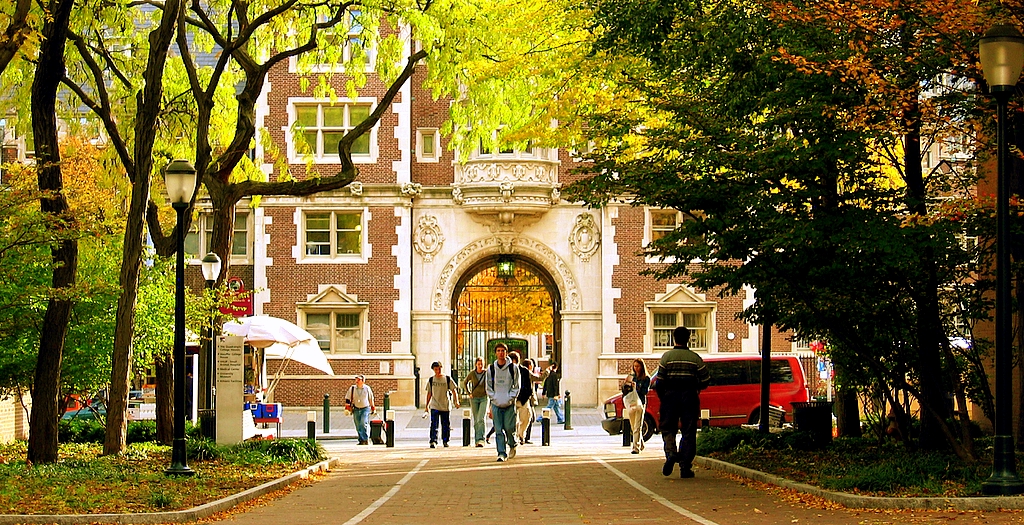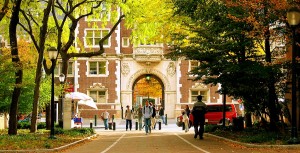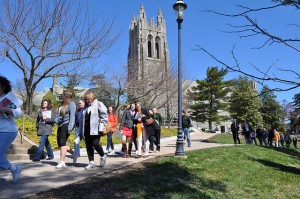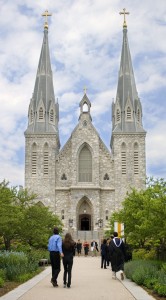
Sustainability on Campus: Philly Universities Go Green
We compared the greenest hotels, coffee shops, and more (obviously, that’s in our name). However, one big player in the sustainability game is often overlooked: universities.
Philadelphia is lucky enough to have a number of high-ranking universities. the majority of these schools are making progress in sustainability, with initiatives growing annually and beyond their own campuses.
Let’s take a look at a handful of these schools and the programs that they’ve been implementing.

Penn’s Green Strides
In 2007, Penn joined the American College and University President’s Climate Commitment to reduce their greenhouse gas emissions. Since, they’ve exceeded targets through increased use of renewable energy and continued efforts to reduce their total energy use.
Here are additional Penn sustainability programs:
- Move-In Green – During the three days of move in, volunteers help with recycling in the University housing, staff tables and assist with events that help incoming students get involved in sustainability.
- Rethink Your Footprint – A three-week campaign challenges students to think more about waste minimization through programs, educational events, and other activities. Rethink Your Footprint focuses not only on recycling but also on source reduction.
- Power Down Challenge –For four weeks, both residential and academic buildings compete against each other to reduce the most energy.

Drexel Eco Dragons
Starting in 2008, Drexel became the first university to monitor the environmental impact of their buildings using Green Globes. Green Globes rates the buildings and sets milestones for improvement; even posting results online to show the majority of Drexel’s buildings are sustainable and continue to improve.
Here’s more how Dragons’ fire is turning green:
- Farmer’s Markets – Every Tuesday, Drexel hosts local farmers to come and sell their produce to professors and students since 2008.
- Recycle Mania –Drexel is one of many universities to compete in this annual competition, to see who can gather the most recycling and the least amount of waste per capita. This is their 7th year competing.

Saint Joe’s Soars toward Green
Saint Joe’s has made strides toward sustainability through numerous projects over the past few years, including composting, installing drainage systems to prevent runoff, implementing chillers to reduce AC usage, and more.
Here’s some more of the Hawks’ green programs:
- Community Garden – Students are invited to help tend the SJU community garden, which not only teaches students about sustainable horticulture, but also donates over 150 pounds of food to Philabundance annually.
- Green Fund – A group of students handle a sizable budget to improve sustainability and green initiatives on campus. This past year has seen them place recycling bins in all classrooms and resident rooms, install water bottle filling stations throughout campus, and distribute water bottles and reusable to-go containers to all freshmen amongst other projects.

Villanova Wildcats’ Hunt for Greener Pastures
Since 2007, Villanova has been working toward their goal of carbon neutrality by 2050. Adding two LEED-certified buildings and a third party rating sustainability system helped move them closer to achieving this goal.
Here’s more on how Villanova is going green:
- Educational Panels – Many student-led committees sponsor educational panels to raise awareness about sustainability issues like fair trade.
- Earth Day – Students run events the entire week to raise awareness and get other students involved in the sustainability efforts the university is making. Events include a farmers market, campus sustainability tours, and a service trip amongst others.
Temple Owls’ On-Point Sustainability
Even though Temple is growing both in campus size and student body population, in only six years Temple has already reduced their greenhouse gas emissions by 16%. In addition, there have been many strides toward behavioral changes for both students and employees that help to eliminate energy waste, such as the switch to doing housekeeping in the day during the summers so the buildings can be powered down at night.
Here are some more of the Owls’ outstanding programs:
- Campus Clean Ups – Throughout the year, groups of students gather to clean up portions of Temple’s campus that could use a little love. Students are given free food for their efforts
- Rad Dish Café – A new food option allows students to have a great food co-op right in their backyard that only serves locally grown food and operates on a zero-waste supply chain model. It offers great vegetarian and vegan options as well.
Readers, what other initiatives have local universities have taken? Tell us in the comments!









